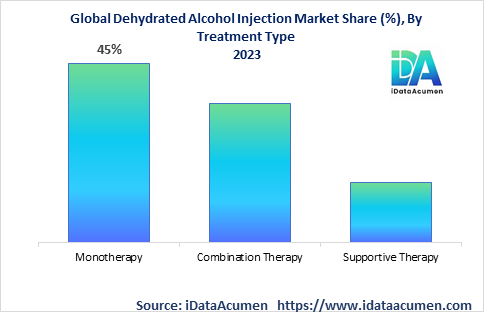The Global Dehydrated Alcohol Injection Market, comprising antidote formulations used to treat toxic alcohol poisoning, is expected to reach US$ 346.8 million by 2030 expanding at a CAGR of 8.1% during the 2024-2031 period according to the latest analysis from IDataAcumen. Key growth drivers include the rising incidence of methanol poisoning due to consumption of illicit liquors, updating of treatment protocols designating injections as first-line therapy, and ongoing improvements in rapid diagnostics aiding early case confirmation.
Dehydrated alcohol injections work by inhibiting the metabolism of ethylene glycol or methanol ingested, preventing the accumulation of toxic metabolites responsible for metabolic acidosis, renal failure and blindness. Formulations contain either ethanol or fomepizole as the active drug. The market is witnessing favorable expansion owing to poisoning outbreaks as well as a shift towards using injections over alternatives like dialysis for toxin removal.
The recent growth trajectory is further being empowered by macro tailwinds such as investments by manufacturers into expanding production capacities and emergence of newer antidotes with improved stability. Geographies with high prevalence of recreational non-commercial alcohol intake and lack of monitoring continue to offer untapped potential.

Key Market Growth Drivers:
The primary growth levers stem from greater incidence due to the wide availability of methanol containing solvents and cleaners coupled with consumption habits involving homemade or illicit alcohols:
- Over 30,000 methanol poisoning cases are reported annually worldwide with developing regions disproportionately affected. Banning of toxic additives and strict vigilance against spurious liquors by authorities will limit future occurrences.
- Clinical guidelines have been revised across most major markets updating standard protocols to recommend dehydrated alcohol antidote injection as the foremost therapy for suspected poisoning cases. Positioning injections as first-line agents will transform utilization patterns.
Market Trends and Opportunity:
Prominent trends that are improving access while lowering costs include combination therapy involving dialysis for efficient toxin clearance alongside injections as well as development of alternative delivery routes like long-acting intramuscular injections for simplified administration paradigms. Methanol poisoning outbreak response kits containing rapid diagnostics, medical charcoal and alcohol injection vials are also gaining adoption for emergency preparedness.
An opportunity exists for label expansion into related indications like diethylene glycol toxicity which displays mechanistic similarities and can leverage the established infrastructure for methanol antidotes. Repurposing for agents with overlapping pathophysiology will diversify portfolios.
Key Regional Insights:
- North America represented the largest regional market, accounting for a 38.2% value share in 2022 owing to high awareness, treatment rates and availability of novel drug candidates in developmental pipelines from presence of companies such as Recro Pharma, Genexine and Mission Therapeutics concentrated in the region.
- Europe held the second largest share at over 28% driven by public health initiatives around methanol control and antidote stockpiling mandates for hospitals in some Eurozone countries. Market penetration is assisted by reimbursement coverage for injectable antidotes in the EU5 which improves access.
- Notable companies with leading market positions include Recro Pharma, Par Pharmaceutical, Shandong Xinhua Pharmaceutical and Vertellus Holdings. Other key players undertaking expansion strategies include Linyi Sanai Pharmaceutical, Xizang Haisco Pharmaceutical and Jiangsu Hengrui Medicine amongst others. Competition is expected to intensify with differentiation attempted through novel delivery mechanisms.
The market is poised for strong growth in the coming decade off the back of rising evidence supporting the efficacy of early antidote therapy intervention through injections to improve clinical outcomes, address pathophysiological factors responsible for morbidity and mortality while also shortening hospital length of stay.
Market Segmentation:
By Treatment Type
- Monotherapy
- Combination Therapy
- Supportive Therapy
By End-User
- Hospitals
- Clinics
- Ambulatory Centers
- Emergency Services
- Other End Users
By Distribution Channel
- Hospital Pharmacies
- Retail Pharmacies
- Online Pharmacies
By Region
- North America
- Europe
- Asia Pacific
- Latin America
- Middle East & Africa
Definition:
“The dehydrated alcohol injection market encompasses pharmaceutical products used to treat suspected methanol or ethylene glycol poisoning. These injectable formulations contain either ethanol or fomepizole as the active ingredient and work as antidotes by inhibiting the metabolism of toxic alcohols before they can damage the body. The market includes both branded and generic sterile injections administered via the intravenous route in a clinical setting. Key end users include hospitals, clinics, and emergency responders treating accidental or intentional poisoning cases.